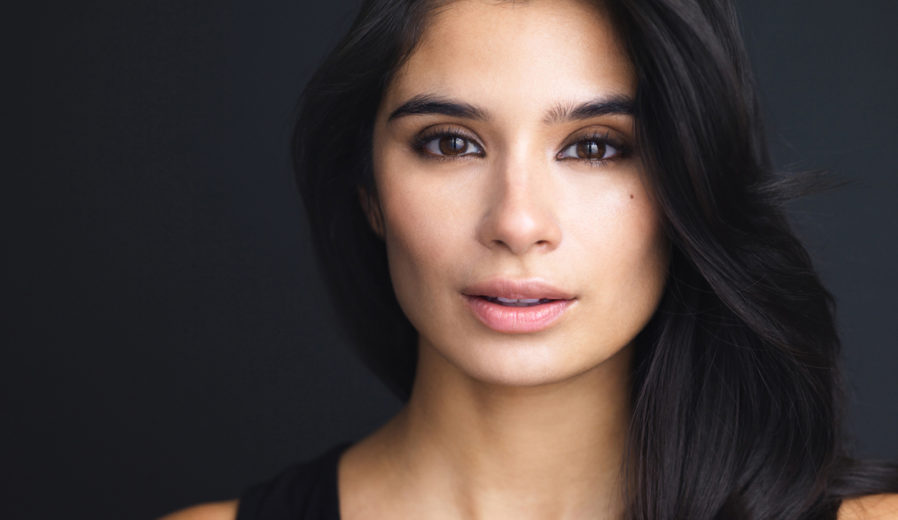Diane Guerrero has charmed us in her roles as street-savvy Maritza Ramos on the critically acclaimed show Orange is the New Black and as BFF extraordinaire Lina on Jane the Virgin. Now, she is adding published author and immigration rights activist to her repertoire with the recent release of her book In the Country We Love: The True Story of a Family Divided. In it, the 29-year-old shares her personal experience with immigration telling the ordeal of having her parents deported back to Colombia at the age of 14, leaving her to fend for herself alone here in the U.S. in order to pursue her dreams.
It was a devastating time that led her into depression and self-hate. But it’s also the endearing story of how she triumphed over it all and made it through, becoming a leading voice for immigration reform along the way. Diane recently spoke with ‘LLERO to discuss the motivation behind the book, the most important thing people can do regarding immigration reform and what we can expect next for Maritza when the new season of OITNB returns this month.
In the Beginning
‘LL: Can you tell me a little about your background?
Diane: I am a child of Colombian immigrants. I grew up in Boston. I was born here in New Jersey then we moved to Boston when I was a kid and was raised in Boston.
‘LL: What or who influenced you growing up in terms of acting?
Diane: I didn’t always know that I wanted to be an actor. I think that I always knew I wanted to be a performer and I think that I envisioned myself on the stage in the beginning. In the book I talk about that how I really wanted to do musical theater and sing and dance and do the whole package. But I didn’t really see many people on TV that looked like me so I figured in a way that I didn’t see a place for me there. But then, as I got older, that hunger started growing more. I would watch TV and watch movies and say, ‘My God, I can do that too.’ Honestly, I’ve been influenced by everything from cartoons to watching Commando. [Laughs]
‘LL: What did you parents think about you wanting to be a performer/entertainer?
Diane: I have to be honest, my parents were very encouraging. It was tough because my parents were hard-working but they were also undocumented and immigrants and often they had to worry about how to make ends meet, how to put food on the table. So, they did encourage me a lot but they didn’t have the means to really nurture that. They just told me from the beginning if I like it I have to stick with it and be resourceful and look for ways to immerse myself in this sort of work.
Season Four of Orange Is the New Black
‘LL: Can you tell me what’s in store for Maritza in the upcoming season of OITNB?
Diane: I’m so excited for you guys to see! I think you’re going to see a lot more of Maritza and what’s going on in the present. I think that you’re going to see a lot of new people and you’re going to see how the original gangsters handle the new blood, if you will. So, I think that it’s a really, really exciting season. As far as my character, I think you’re going to get into little more of her world and see what she’s about.
‘LL: Any specific storylines or topical situations that are going on currently in real life that they will touch on?
Diane: We’re going to see a lot of the problems that prisons do face explored. One is overcrowding and lack of resources. So, I think we’re touching upon that and that’s the main theme. I think that you’re going to see a lot of what’s going on in society right now reflected in this season which I think is so wonderful.
‘LL: What do you enjoy most about playing Maritza?
Diane: I hear a lot of people who are like, ‘Oh, that’s such a stereotypical character,’ but I don’t find that at all. I feel like what Orange does, which is amazing, is that it will show you a “stereotype” and then it breaks it down. What’s so lovely about seeing these stories from prison is that you think, sometimes as a society we do it – like it or not, where we see a person that’s been to jail or goes to jail and [we] automatically categorize them as a criminal, we don’t see anything else. I think that with this show it shows you, “hey” this person made a mistake but look at all the other things this person is interested in, look at everything that this person has on their plate. I’m just learning to like who Maritza is – she is from the streets. She is a girl who maybe didn’t have the of best luck and who didn’t have the best set of cards, but I think you’ll see how she deals with that and what she had to do to survive. I like playing that and I like the audience learning as we all learn along the way, that there is more to a person than you think.
‘LL: Where would you like to see your character go in the series?
Diane: I’d like to see her do some good things. I’d like to see her do some positive things for the prison. That’s where my whole tip is right now – civic duty, civic engagement and just overall trying to live with purpose. So, I’d like to see that come from her. You wouldn’t think it because you normally think she’s dumb or more of a silly character but I’d like see her take some initiative and be a leader. We’ll see, hopefully, in Season Five.
Writing In the Country We Love: The True Story of a Family Divided
‘LL: Can you talk to us about the inspiration for writing In the Country We Love: The True Story of a Family Divided?
Diane: Well it was my life. My parents had to struggle with the immigration system in this country and as a result they were deported when I was 14. That hit me really, really hard because I decided to stay behind and finish my studies. I took it as an opportunity to really get out there and follow my dreams. So, the book was inspired by the current political system. Right now we’re hearing a lot about immigration and what we plan to do as a country as far as our immigration problem. I recognized that the immigration system in this system is broken and I learned that from personal experience and also from seeing 11 million families in the United States who have been here for years however there is no clear path for citizenship for them. And they are undocumented not because they want to be undocumented but because there is no clear way for them to get those papers. And we’re being marginalized and criminalized for being here undocumented while we simultaneously contribute to this economy and would like to do that legally.
I think I just wanted to weigh in on the rhetoric, on the conversation. Especially now with Donald Trump saying all these nasty things about who the immigrant is, so I really wanted to change the conversation. I really wanted to change the culture in which we look at immigrants and undocumented people in this country. This is a human issue not just a political issue and I experienced this first hand. It was extremely traumatic and I know what it is and I had to share it because millions of families are going through the same thing.
‘LL: What were some the challenges in writing the book?
Diane: I mean just revisiting everything I had been through, some things I really had stored away. But also, writing a book is hard! I got help with it but even that is difficult to really let go of your work and let somebody have so much influence in it and kind of try to convey what you really mean and what you really feel. I had a hard time with the whole process because I probably didn’t want to let go of the story at all since it is something so personal. Revealing all that to the public, giving myself to the public in that way was so difficult. But you know I was so gung-ho about the movement, so I was like alright, and for me I always like to do things big so I figured you have to make a big splash if you want to be heard. So that was part of my sacrifice. It’s a really small price to pay to get your voice really heard and maybe hopefully have others join that movement and encourage others to use their voices. And to think, ‘My story is important, my story is valuable and it deserves to be told and I don’t need to be ashamed of who I am.’ That was a big moment for me where I was like okay, I can’t be ashamed of my story any longer, it is an American story, it is part of this country’s history and it deserves to be looked at as such.
‘LL: What groups do you work with on these issues?
Diane: I do work right now with Mi Familia Vota, which is a civic engagement group and they encourage the Latino community to vote. I’m also working with the ILRC, which is the Immigration Legal Resource Center and they provide information to people who don’t know about the current immigration system, who need help, who are in danger of being deported themselves. They offer a lot of information through that. So I’m trying to gear my message towards education and telling people to educate themselves on this issue if they want to really help themselves — and get rid of the fear and turn that fear into action. That’s why I’m working with these groups that provide a lot of education to people. Then along the way I’ve met a lot of immigration groups that are on my side like Chirla and Voto Latino. So, I’m doing a lot of side projects with these organizations, too. I get pitched a lot of projects and anything that coincides with my message I’m down for. We are all a community so we have to work together on this.
For more info about upcoming book signings and events go to www.Inthecountrywelove.com. Catch Diane Guerrero on OITNB when Season Four premieres on Netflix June 17th.
https://www.youtube.com/watch?v=c6O9rfoz0f8
Orange Is the New Black Photo/Copyright Lions Gate Television & Tilted Productions
Diane Guerrero at book signing/Johnny Louis/Wire Images/Getty Images

